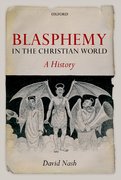This Note considers the blasphemy provisions of Ireland’s 2009 Defamation Act and examines its limitations on religious expression. By analyzing the effects of religious expression’s omission from the Act’s protection, this Note argues that enforcement under the Act may be impermissible under both Bunreacht na hÉireann and international law. To rectify the Act’s failure to defend religious expression, this Note proposes that the Act be amended to permit religious expression as a defense for blasphemy. It then applies the proposed defense to examples of speech that otherwise might run afoul under the Act.
Category: Blasphemy
Should galleries and museums display offensive art?
 I have on this blog regularly discussed the extent to which offensive speech can be restricted. For example, there are many (many) posts on this blog on censorship and blasphemy. Furthermore, I have referred to the censorship of Guillaume Apollinaire (here and here), Carolina Gustavsson, Aldous Huxley, DH Lawrence (here, here and here), James Joyce, John Latham, Robert Mapplethorpe and Vladimir Nabokov. Moreover, I have analysed the kinds of reasons why this kind of speech should not be censored: free speech means freedom for the thought we hate, even that of David Irving (eg, here, here, here, and here), Jean-Marie le Pen, or Kevin Myers, and even – especially! – in multi-cultural societies, especially – especially!! – online.
I have on this blog regularly discussed the extent to which offensive speech can be restricted. For example, there are many (many) posts on this blog on censorship and blasphemy. Furthermore, I have referred to the censorship of Guillaume Apollinaire (here and here), Carolina Gustavsson, Aldous Huxley, DH Lawrence (here, here and here), James Joyce, John Latham, Robert Mapplethorpe and Vladimir Nabokov. Moreover, I have analysed the kinds of reasons why this kind of speech should not be censored: free speech means freedom for the thought we hate, even that of David Irving (eg, here, here, here, and here), Jean-Marie le Pen, or Kevin Myers, and even – especially! – in multi-cultural societies, especially – especially!! – online.
I was reminded of all of this by two recent blogposts. …
Blasphemy and the European Court of Human Rights
 Robert A Kahn (University of St Thomas School of Law, Minnesota) A Margin of Appreciation for Muslims? Viewing the Defamation of Religions Debate Through Otto-Preminger-Institut v Austria 5 Charleston Law Review 401 (2010-2011) (abstract; via SSRN):
Robert A Kahn (University of St Thomas School of Law, Minnesota) A Margin of Appreciation for Muslims? Viewing the Defamation of Religions Debate Through Otto-Preminger-Institut v Austria 5 Charleston Law Review 401 (2010-2011) (abstract; via SSRN):
…Critics of the global standard outlawing defamation of religions often view the proposal as an effort by radical Muslims to deprive the liberal West of long-held liberties. What if however, the supporters of the proposal are surprisingly moderate in what they ask for? What if the liberal West itself has a history of banning blasphemy? To explore these questions, this essay looks at the defamation of religions debate from the vantage point of Otto-Preminger-Institut v Austria 13470/87, (1995) 19 EHRR 34, [1994] ECHR 26 (20 September 1994) in which the European Court for Human Rights upheld an Austrian prosecution of a film potentially offensive to Catholics. The Otto-Preminger case unsettles the critics’ arguments in two ways. First, the majority suggests one could ban some blasphemy without stifling religions debate. Second, the dissent, while opposing the prosecution, would have allowed Austria to ban violent and abusive attacks on religious groups. This suggests a compromise where defamation of religions proposal is read as calling for a ban on the incitement of religious hatred.
A good book is the precious lifeblood of a master spirit
 The title of this post is taken from the third paragraph of Milton’s Areopagitica. As I commented in an earlier post, one of the classic liberal justifications for freedom of expression was stated by John Milton (pitctured left) in his Areopagitica – A Speech for the Liberty of Unlicenc’d Printing, to the Parlament of England. According to The Writer’s Almanac with Garrison Keillor (with added links):
The title of this post is taken from the third paragraph of Milton’s Areopagitica. As I commented in an earlier post, one of the classic liberal justifications for freedom of expression was stated by John Milton (pitctured left) in his Areopagitica – A Speech for the Liberty of Unlicenc’d Printing, to the Parlament of England. According to The Writer’s Almanac with Garrison Keillor (with added links):
…It was on this day in 1644 that John Milton published a pamphlet called Areopagitica, arguing for freedom from censorship. He said,
I wrote my Areopagitica in order to deliver the press from the restraints with which it was encumbered; that the power of determining what was true and what was false, what ought to be published and what to be suppressed, might no longer be entrusted to a few illiterate and illiberal individuals, who refused their sanction to any work which contained views or sentiments at all above the level of vulgar superstition.
He compared the censoring of books to the Spanish Inquisition and claimed that the government wanted “to bring a famine upon our minds again.”
The Curious Persistence of Blasphemy
 Jeremy Patrick (Osgoode Hall Law School, York University) has just made an important new paper “The Curious Persistence of Blasphemy” available via SSRN.
Jeremy Patrick (Osgoode Hall Law School, York University) has just made an important new paper “The Curious Persistence of Blasphemy” available via SSRN.
Despite expectations to the contrary, blasphemy laws and their modern-day counterparts persist in a surprising number of jurisdictions around the globe. This article discusses four examples: the “defamation of religion” movement at the United Nations, the surprising resurrection of blasphemy law in Ireland, the Australian trend toward enacting “religious vilification” laws, and the problem of formal illegality and private violence for blasphemous speech in Pakistan. Next, blasphemy is considered from three conceptual angles: the religious, the legal, and the secular/cultural. Last, the curious persistence of blasphemy is examined through an inquiry into why people blaspheme to begin with, and what harms (real or perceived) are caused by blasphemy. The conclusion here is that as long as societies hold something sacred – religiously or culturally – blasphemy will remain an operative concept and legal or social pressure to suppress blasphemous statements will continue to persist.
On the position here in Ireland, Patrick provides an excellent summary:
…B. Ireland’s Surprising Resurrection of Blasphemy
Ireland has had a strange and surprising relationship with blasphemy laws. The earliest reported common law prosecution for blasphemy dates to 1703, and a couple of other prosecutions have been discovered dating to the mid 1800s.
Blasphemy from ancient Greece to modern Ireland
 Earlier this week, I had the great good fortune to attend an enjoyable lecture presented by the, Long Room Hub, Trinity College Dublin. It was
Earlier this week, I had the great good fortune to attend an enjoyable lecture presented by the, Long Room Hub, Trinity College Dublin. It was
Blasphemy: Historical anachronism or modern crime?
by Professor David Nash, Department of History, Oxford Brookes University, UK. He is the author of Blasphemy in Modern Britain 1789-present (Ashgate Publishing, 1999 | Amazon) and Blasphemy in the Christian World (Oxford University Press, 2007 hbk; 2010 pbk | Amazon | cover left). His talk was in three parts: the historical context; the unhappy fit with current models and theories of human development; and the implications of taking blasphemy seriously again.
First, he used the historical context to illustrate the various reasons for longevity and adaptability of concepts of blasphemy. In ancient Greece, blasphemy consisted of speaking ill of the gods and of disturbing the peace. In early Christian dogma after the Council of Nicea in AD 325, it served to reinforce the virtues of orthodoxy. Medieval Christian Europe saw blasphemy as an element of heresy, but in the 13th century, blasphemy becomes decoupled from heresy, and it evolves into what Nash charaterised as the ‘passive blasphemy’ model, where the definition and enforcement of blasphemy is a matter for the State, seeking to eradicate states of mind and opinion that are dangerous to the community.…
Gallimaufry
 Dr Johnson defined gallimaufry as
Dr Johnson defined gallimaufry as
1. A hoch-poch …
2. Any inconsistent or ridiculous medley. …
Here’s another hoch-poch, or hotch-potch (though, of course, not a hotchpot) of links relevant to the themes of this blog that have caught my eye over the last while. I’ll begin and end with some stories of censorship, and along the way I’ll mention open wifi, international perceptions of Ireland, typography, mobile phones, broadcasting, and the future of our universities.
First, as a supplement to my post on the Lady Chatterley’s Lover trials, Alan Travis in the Guardian argues that the failure of the Chatterley prosecution secured the liberty of literature in Britain over the past 50 years. By way of a similar supplement to my post on the decision of the European Court of Human Rights in Akdas v Turkey 41056/04 (15 February 2010) that a Turkish ban on Apollinaire’s Les Onze Mille Verges infringed Article 10 of the European Convention on Human Rights, the Guardian reports that Turkey is at it again: publisher Irfan Sanci is being prosecuted – under the same Turkish provisions that were found wanting in Akdas – for publishing a translation of another Apollinaire noverl, Les exploits d’un jeune Don Juan (The Exploits of a Young Don Juan).…
Blasphemy from Ireland to Indonesia via South Park
 The Council of Europe has just published the Venice Commission‘s Report on Blasphemy, insult and hatred – Finding answers in a democratic society (Science and Technique of Democracy No 47, 2010) (cover left) (earlier related publications here). Religious accommodation, mutual understanding, and social diversity constitute a significant challenge for modern western democracies. This report argues that “diversity is undoubtedly an asset, but cohabiting with people of different backgrounds and ideas calls for a new ethic of responsible intercultural relations”. The recent Irish response has been to introduce an offence of blasphemy in the Defamation Act, 2009. At its conference last weekend, the Labour Party debated and passed three motions (111, 112, 113) which condemned the introduction of the offence of blasphemy, and called for its repeal, and called for a referendum proposing to delete the word “blasphemous” from the Constitution (presumably as part of its wholesale constitutional revision). This is welcome, but doesn’t go far enough: the entire free speech clause should be thoroughly reformed (especially if there is to be a convention to develop a new constitution). Of course, this might not be necessary in the short term, since the provisions might very well conflict with the current text of the constitution in any event.…
The Council of Europe has just published the Venice Commission‘s Report on Blasphemy, insult and hatred – Finding answers in a democratic society (Science and Technique of Democracy No 47, 2010) (cover left) (earlier related publications here). Religious accommodation, mutual understanding, and social diversity constitute a significant challenge for modern western democracies. This report argues that “diversity is undoubtedly an asset, but cohabiting with people of different backgrounds and ideas calls for a new ethic of responsible intercultural relations”. The recent Irish response has been to introduce an offence of blasphemy in the Defamation Act, 2009. At its conference last weekend, the Labour Party debated and passed three motions (111, 112, 113) which condemned the introduction of the offence of blasphemy, and called for its repeal, and called for a referendum proposing to delete the word “blasphemous” from the Constitution (presumably as part of its wholesale constitutional revision). This is welcome, but doesn’t go far enough: the entire free speech clause should be thoroughly reformed (especially if there is to be a convention to develop a new constitution). Of course, this might not be necessary in the short term, since the provisions might very well conflict with the current text of the constitution in any event.…
